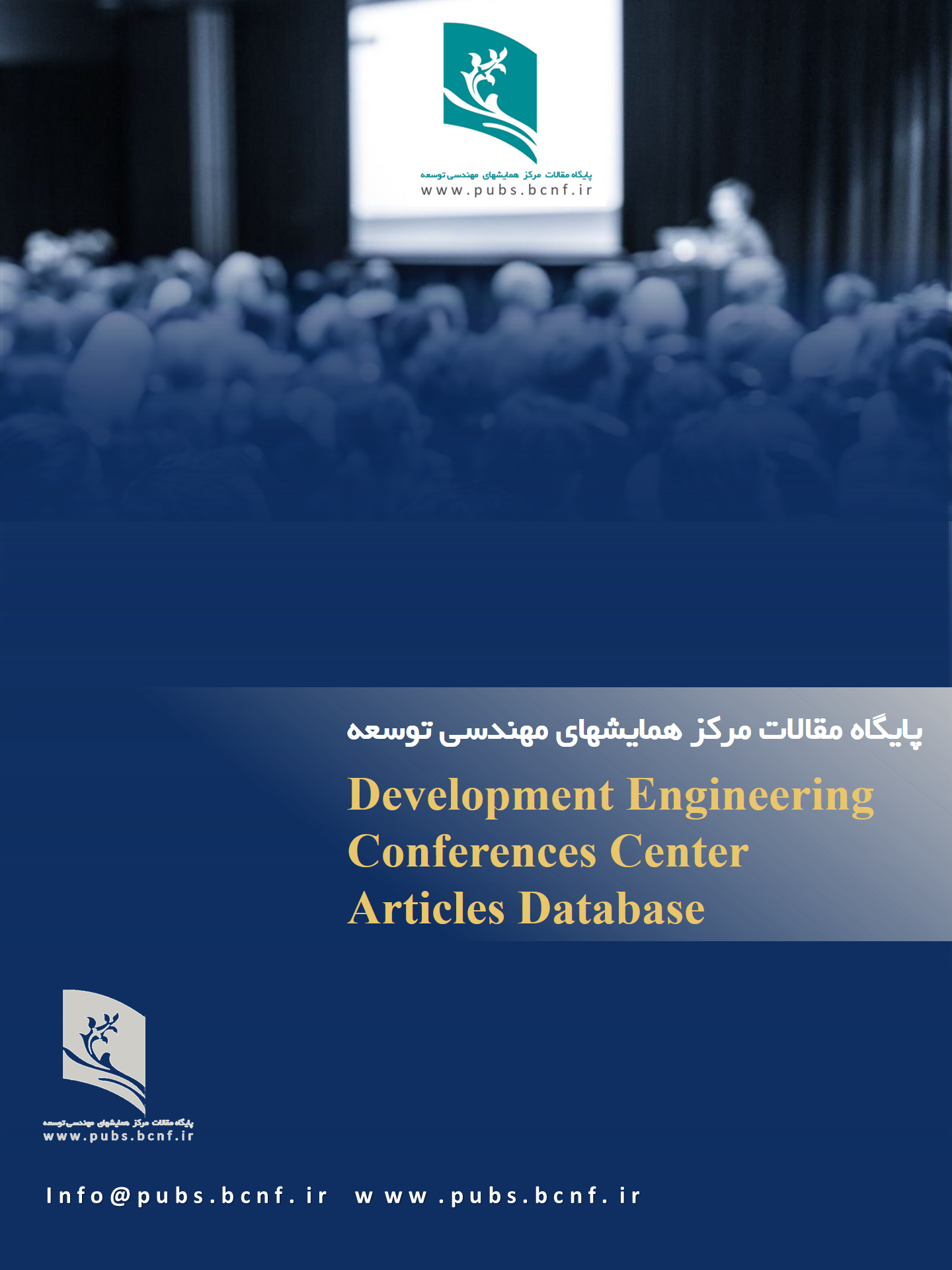Seismic simulation of seismically improved RE (rammed earth) buildings
کلمات کلیدی:
Rammed earth, structure, building, seismic improvement, Analysis, optimizationچکیده
In this research, the seismic response of "Rammed Earth Structures" under an optimization, under the effect of acceleration maps of the Bam earthquake (which was the most destructive earthquake in Iran), was calculated using Abaqus 2021 simulation software. Since the structures in this earthquake were completely traditional this optimization has made for the seismic improvement of these types of structures. In such a way, cement and rebar materials were not used to improve tensile and compressive strength. However, a raft foundation was used in the dimensions of the building with a rigid and integrated connection, in addition to the material, which is based on gypsum and clay. The roofs in this design are presumed composite roofs with wooden beams, and their connection was also considered rigid. In this plan developed to study the effects of the dimensions of the foundation on the health of structures during the earthquake, three different depths were considered for the foundation. This caused the center of gravity of the structure to move towards the center of the foundation by increasing the dimensions and, as a result, the weight of the foundation, which reduced the stress during the earthquake load. Also, referring to Iran's 2800 regulations, the various seismic response components of these kinds of optimized structures were confirmed. Also, this seismic improvement has other advantages that make it unique such as the lowest price in construction, and industrial construction capability.
دانلودها
مراجع
[1] T. D. Nguyen, T. T. Bui, A. Limam, T. L. Bui, and Q. B. Bui, ‘Evaluation of seismic performance of rammed earth building and improvement solutions’, Journal of Building Engineering, vol. 43, Nov. 2021, doi: 10.1016/j.jobe.2021.103113.
[2] G. M. Calvi, ‘A displacement-based approach for vulnerability evaluation of classes of buildings’, Journal of earthquake Engineering, vol. 3, no. 03, pp. 411–438, 1999.
[3] R. El Nabouch, Q.-B. Bui, O. Plé, and P. Perrotin, ‘Rammed earth under horizontal loadings: Proposition of limit states’, Constr Build Mater, vol. 220, pp. 238–244, 2019.
[4] Q.-B. Bui, T.-T. Bui, M.-P. Tran, T.-L. Bui, and H.-A. Le, ‘Assessing the seismic behavior of rammed earth walls with an L-form cross-section’, Sustainability, vol. 11, no. 5, p. 1296, 2019.
[5] T.-L. Bui, T.-T. Bui, Q.-B. Bui, X.-H. Nguyen, and A. Limam, ‘Out-of-plane behavior of rammed earth walls under seismic loading: Finite element simulation’, in Structures, Elsevier, 2020, pp. 191–208.
[6] D. Easton, The rammed earth house. Chelsea Green Publishing, 2007.
[7] Q.-B. Bui, T.-T. Bui, R. El-Nabouch, and D.-K. Thai, ‘Vertical rods as a seismic reinforcement technique for rammed earth walls: an assessment’, Advances in Civil Engineering, vol. 2019, 2019.
[8] L. Miccoli, U. Müller, and S. Pospíšil, ‘Rammed earth walls strengthened with polyester fabric strips: Experimental analysis under in-plane cyclic loading’, Constr Build Mater, vol. 149, pp. 29–36, 2017.
[9] F. Ávila, E. Puertas, and R. Gallego, ‘Characterization of the mechanical and physical properties of stabilized rammed earth: A review’, Construction and Building Materials, vol. 325. Elsevier Ltd, Mar. 28, 2022. doi: 10.1016/j.conbuildmat.2022.126693.
[10] A. Koutous and E. Hilali, ‘Reinforcing rammed earth with plant fibers: A case study’, Case Studies in Construction Materials, vol. 14, p. e00514, 2021.
[11] V. Toufigh and E. Kianfar, ‘The effects of stabilizers on the thermal and the mechanical properties of rammed earth at various humidities and their environmental impacts’, Constr Build Mater, vol. 200, pp. 616–629, 2019.
[12] P. Zare, S. S. Narani, M. Abbaspour, A. Fahimifar, S. M. M. M. Hosseini, and P. Zare, ‘Experimental investigation of non-stabilized and cement-stabilized rammed earth reinforcement by Waste Tire Textile Fibers (WTTFs)’, Constr Build Mater, vol. 260, p. 120432, 2020.
[13] M. M. Hallal, S. Sadek, and S. S. Najjar, ‘Evaluation of engineering characteristics of stabilized rammed-earth material sourced from natural fines-rich soil’, Journal of Materials in Civil Engineering, vol. 30, no. 11, p. 04018273, 2018.
[14] V. Strazzeri, A. Karrech, and M. Elchalakani, ‘Micromechanics modelling of cement stabilised rammed earth’, Mechanics of Materials, vol. 148, p. 103540, 2020.
[15] D. Ciancio, C. T. S. Beckett, and J. A. H. Carraro, ‘Optimum lime content identification for lime-stabilised rammed earth’, Constr Build Mater, vol. 53, pp. 59–65, 2014.
[16] Y. Wang, M. Wang, K. Liu, W. Pan, and X. Yang, ‘Shaking table tests on seismic retrofitting of rammed-earth structures’, Bulletin of Earthquake Engineering, vol. 15, no. 3, pp. 1037–1055, Mar. 2017, doi: 10.1007/s10518-016-9996-2.
[17] T. Zhou, Z. Zhang, Z. Su, and P. Tian, ‘Seismic performance test of rammed earth wall with different structural columns’, Advances in Structural Engineering, vol. 24, no. 1, pp. 107–118, Jan. 2021, doi: 10.1177/1369433220944506.
[18] T. Zhou and B. Liu, ‘Experimental study on the shaking table tests of a modern inner-reinforced rammed earth structure’, Constr Build Mater, vol. 203, pp. 567–578, Apr. 2019, doi: 10.1016/j.conbuildmat.2019.01.070.
[19] Q. B. Bui, T. T. Bui, R. El-Nabouch, and D. K. Thai, ‘Vertical Rods as a Seismic Reinforcement Technique for Rammed Earth Walls: An Assessment’, Advances in Civil Engineering, vol. 2019, 2019, doi: 10.1155/2019/1285937.
[20] K. C. Shrestha et al., ‘Strengthening of rammed earth structures with simple interventions’, Journal of Building Engineering, vol. 29, May 2020, doi: 10.1016/j.jobe.2020.101179.
[21] T. Hazen, ‘What Is the Cheapest Type of House to Build? (2024)’. Accessed: Feb. 25, 2024. [Online]. Available: https://homeguide.com/costs/cheapest-type-of-house-to-build



